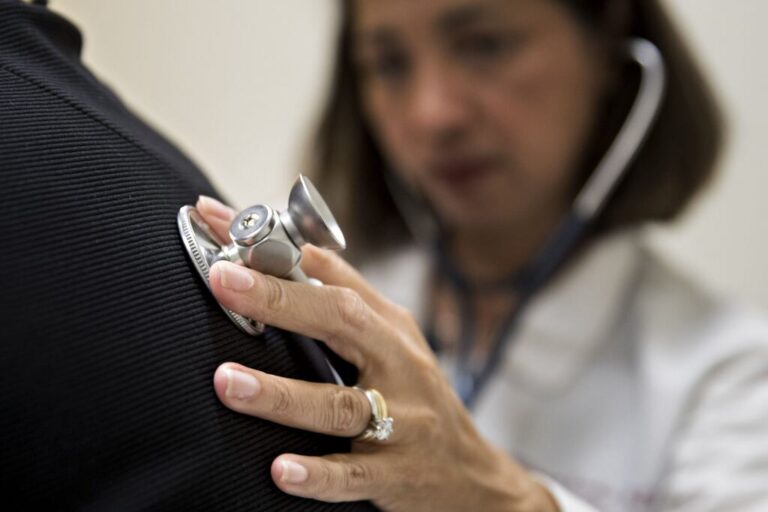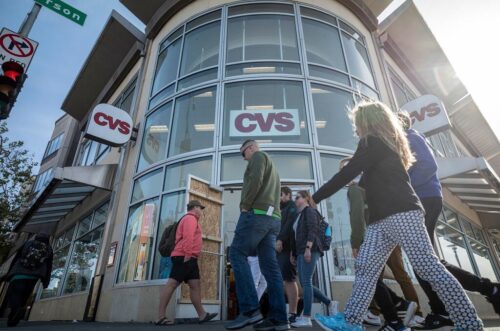PROVIDENCE — Tony Adams drove to a doctor’s office on Monday morning and scribbled out a handwritten letter, pleading with one provider to take him and his two sons on as new patients.
Later that day, he was on the phone with an office in Providence and was told it would be another 18 to 24 months before he could expect a call back. A third office said they aren’t even accepting new patients.
Adams isn’t alone in his quest to find a new doctor in Rhode Island, which has long faced a severe primary care shortage. Over the weekend, he was one of nearly 25,000 adult and pediatric patients who were informed that their doctor’s office, Anchor Medical Associates, would be shutting down this year.
Anchor Medical has been in business for more than 25 years, employs 22 providers, and sees adult and pediatric patients in offices in Lincoln, Providence, and Warwick. The office in Warwick will close on April 30; offices in Providence and Lincoln are expected to close on June 30, according to a copy of the letter Anchor sent to patients, which was obtained by the Globe.
“Of the frontline workers I spoke to, they were all inundated, apologetic and felt for us,” said Adams, 55, who usually sees his doctor twice annually to manage hypertension. “I thought I was starting early to begin the hunt and try to beat the rush of patients — if there’s even a way to do that.”
Leaders at Anchor told their patients they have been unable to hire replacements for their physicians who have retired over the course of the last decade. While costs have continued to increase, low reimbursement rates have made “it extremely difficult to attract new physicians to our state,” Anchor’s letter said.
“We just cannot continue to operate in this increasingly challenging healthcare environment,” their letter said.
A comprehensive study by the Rhode Island Foundation last year found that Rhode Island also had the lowest supply of licensed practical nurses, home health and personal care aides, and physician assistants compared to Connecticut and Massachusetts. In Rhode Island, health care workers are also paid less than their peers, the study found.
“Even if you live in Rhode Island, you could drive 20 minutes away, be in Massachusetts and get paid quite a bit more for your work,” said Dr. Caroline Richardson, the chair of family medicine at The Warren Alpert Medical School of Brown University. “That’s part of the problem.”
In a recent study, Richardson estimated there are just 641 primary care providers for the state’s 1.1 million residents. That’s just one clinician for every 1,700 people. Prior to Anchor Medical’s closure, Richardson estimated that Rhode Island needs at least 300 additional physicians to cover the state.
Most primary care providers also don’t practice primary care full time, said Richardson. She only practices for four hours per week, and fills the rest of her working time at Brown and with research.
“It’s nearly impossible to be a full-time primary care doctor right now because every half day you spend in the clinic generates another half day, if not a full day, of paperwork,” she said.
Many of these patients are now scrambling to find another doctor.
“I think it’s a disaster,” said Richardson. “We already had 100,000 to 200,000 patients [across Rhode Island] who couldn’t find a doctor as it was. Now we’re just adding to the pile.”
Mary Beth Meehan, of Providence, had long speculated that her doctor at Anchor Medical would soon retire, but she did not foresee the facility closing down. After 20 years of seeking care at Anchor Medical, she’s now trying to figure out her next steps: “Do we seek telehealth and then go to my specialists [in Massachusetts] if we have a problem? But what happens to the routine physical? Or the preventative wellness piece? I have no idea how you substitute that,” she said.
Many times, Meehan said, she would message Anchor’s platform if she had a health concern, and would be connected with a physician assistant. Oftentimes, they’d tell her to report to the office the same day.
“We had an office who was really invested in your health that you could easily access,” said Meehan. “I’ve had shingles, I’ve had sciatica, and things that were seen that day. That’s what I’m feeling the loss of.”
“Where am I supposed to go now?”
To address the shortage that’s been building for years, the state has recently attempted to recruit talent by launching a new grant program for doctors, nurses, and physician assistants by providing up to $90,000 per calendar year as an incentive to train and mentor burgeoning medical professionals.
R.I. Senate unveils health care bills and takes aim at doctor shortage
In July 2024, the Rhode Island State Senate formed a 21-member commission that is expected to study the state’s health care workforce with a focus on educating and retaining primary care physicians, as well as analyze the potential for establishing a medical school at the University of Rhode Island. A medical school could take several years to fund, construct, and get accredited.
But some critics said these efforts are not enough.
“A medical school won’t solve this problem in time,” wrote Rhode Island Attorney General Peter F. Neronha, a critic of the governor, on social media. “$400,000 in loan forgiveness — a total joke — won’t either. When will our leaders that can move this needle wake up?”
Jessica Wharton, a spokeswoman for Brown University Health, the largest health care system in the state, said Anchor Medical closing was a “significant hardship” for many families.
“Rhode Island’s healthcare system is in crisis due to low reimbursement rates, leading to provider shortages, clinician burnout, and financial instability among hospitals and physician groups,” Wharton said in a statement. “Without addressing these funding challenges, we anticipate further reductions in services and patient access.”
Patients like Adams said he can’t wait 18 to 24 months to see a doctor.
“I’ll have to go to Massachusetts to find a doctor,” he said. “I’m ready to go there next.”
A doctor you can text, call, and see within a day? Inside the growing model of ‘direct primary care.’Physician assistants rally for bill to help them ease primary care crunchER visits. Concierge care. Traveling out of state. How Mass. patients are navigating the broken primary care system.



Comment count: